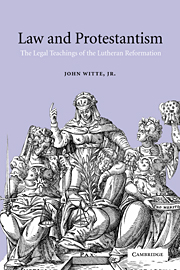Book contents
- Frontmatter
- Contents
- List of illustrations
- Foreword by Martin E. Marty
- Acknowledgments
- List of Abbreviations
- Introduction
- 1 Canon law and civil law on the eve of the Reformation
- 2 Loving thine enemy's law: The Evangelical conversion of Catholic canon law
- 3 A mighty fortress: Luther and the two-kingdoms framework
- 4 Perhaps jurists are good Christians after all: Lutheran theories of law, politics, and society
- 5 From Gospel to Law: The Lutheran reformation laws
- 6 The mother of all earthly laws: The reformation of marriage law
- 7 The civic seminary: The reformation of education law
- Concluding reflections
- Bibliography
- Index
4 - Perhaps jurists are good Christians after all: Lutheran theories of law, politics, and society
Published online by Cambridge University Press: 17 November 2009
- Frontmatter
- Contents
- List of illustrations
- Foreword by Martin E. Marty
- Acknowledgments
- List of Abbreviations
- Introduction
- 1 Canon law and civil law on the eve of the Reformation
- 2 Loving thine enemy's law: The Evangelical conversion of Catholic canon law
- 3 A mighty fortress: Luther and the two-kingdoms framework
- 4 Perhaps jurists are good Christians after all: Lutheran theories of law, politics, and society
- 5 From Gospel to Law: The Lutheran reformation laws
- 6 The mother of all earthly laws: The reformation of marriage law
- 7 The civic seminary: The reformation of education law
- Concluding reflections
- Bibliography
- Index
Summary
LUTHER AND THE JURISTS
“Jurists are bad Christians.” This is one of Luther's most famous aphorisms about law that every German schoolboy still learns and that every pious Protestant still ponders when considering the legal profession. The phrase was of a piece with many other derogatory comments that Luther made about jurists. “Of the Gospel, jurists know nothing, and therefore they are justly excluded from the circuit of divinity.” “Every jurist is an enemy of Christ.” “We theologians have no worse enemies than jurists.” “There is eternal strife and war between jurists and theologians.” “Every jurist is either a good-for-nothing or a know-nothing.” “A jurist should not speak until he hears a pig fart” for only then will his words have a proper climate to be appreciated. And more scatological still: “I shit on the law of the pope and of the emperor, and on the law of the jurists as well.”
Luther's shrill comments were, in part, the fallout of his bitter struggles with the University of Wittenberg's law faculty about teaching papal laws to Evangelical students. They were, in part, general echoes of centuries-long antipathies between the faculties of law and theology in German and other Western universities. They were, in part, more specific echoes of contests among sixteenth-century Germans about the propriety of replacing German customary law with Roman law and Romanist and civilian jurisprudence.
- Type
- Chapter
- Information
- Law and ProtestantismThe Legal Teachings of the Lutheran Reformation, pp. 119 - 176Publisher: Cambridge University PressPrint publication year: 2002



